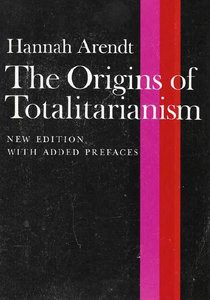Stephen J. Whitfield on Hannah Arendt’s The Origins of Totalitarianism (1951)
Hannah Arendt, The Origins of Totalitarianism (New York, NY: Harcourt, Brace and Co, 1951).
Even over the span of more than half a century, I can still vividly recall when The Origins of Totalitarianism (1951) first came to my attention, as the gesture of a Tulane University upperclassman named Burt Channing. A gangly bohemian from Boston who had changed his family name from Cohen and had become a Unitarian, he showed me his paperback edition (1958), and told me how brilliant its author was. Channing was right, even though I could grasp the power of Hannah Arendt’s book only after devouring it a couple of years later. The psychic depths that this volume tapped in me undoubtedly mattered as much as the specific insights that Arendt seemed to offer on every page, even in every paragraph. My parents were Jewish refugees from Germany and Romania, and I can still remember the impact of the boldness of the first section of Origins: “Antisemitism.” She made it integral rather than peripheral to the history of Europe over the course of the previous century and a half. But her second section, “Imperialism,” resonated too. While studying at the Sorbonne in 1963-64, I had for the first time encountered Africans and Arabs; and flipping through pages of Jeune Afrique made me aware of the continent that Arendt would describe as a site for testing the totalitarian thesis of human superfluity. But it was the third section, entitled “Totalitarianism,” that recorded the danger and irrational disorientation that permeated modern politics. Even as the twenty-first century may well become known as the age of terrorism, marking places in accordance with the atrocities committed there, The Origins of Totalitarianism remains a work that testifies to something unhinged and perilous in Western history, a rebuke to the reassurances of faith and hope.
In 1945, a mere four years after finding refuge in the United States, Arendt had begun writing this great book. Its broad themes included the collapse of the nation-state, the ineffectuality of the bourgeoisie and their Continental party system, the fragility of what she called “the right to have rights,” and perhaps above all the crisis of modernity itself (with its pervasive feelings of anomie and alienation). By 1947, after largely completing the first two sections, she realized that the third section required her to deal seriously with the U. S. S. R. Arendt was certainly not the first thinker to insist upon the parallels between Nazism  and Stalinism. Indeed several hundred leftist intellectuals and activists had felt obliged, in a letter published in The Nation on August 26, 1939, to denounce “the fantastic falsehood that the U. S. S. R. and the totalitarian states are basically alike.” But no work of historical analysis before Arendt’s had taken such imaginative leaps in detecting similarities between the Soviet Union and the Third Reich. The case that she advanced is that totalitarianism was a horrifying variety of the tyranny classified by the ancients, with only two examples.
and Stalinism. Indeed several hundred leftist intellectuals and activists had felt obliged, in a letter published in The Nation on August 26, 1939, to denounce “the fantastic falsehood that the U. S. S. R. and the totalitarian states are basically alike.” But no work of historical analysis before Arendt’s had taken such imaginative leaps in detecting similarities between the Soviet Union and the Third Reich. The case that she advanced is that totalitarianism was a horrifying variety of the tyranny classified by the ancients, with only two examples.
What made them so modern entailed the extinction of the boundaries between the state and civil society, the destruction of privacy and of personal autonomy through omnipresent terror, and the deliberate infliction of mass suffering and mass murder by a single dictator who could impose his will through a single party or movement. Such domination, such cruelty had no precedents, and–in 1951–no counterparts. Even Arendt’s most generous readers must nevertheless acknowledge, because retrospective criticism has so often consigned the book to an artifact of the Cold War, that she knew much less about the Soviet Union than she did about the Third Reich. She could not read Russian, though that limitation can be overstated. (Isaac Deutscher mentions in his biography of Stalin, published in 1949, that he had gained access to exactly one private letter written by the despot.) Although The Origins of Totalitarianism exhibits an intuitive grasp of the homologous character of the two regimes, the deeper and more daring exposition of Nazism that her book presents makes it asymmetrical.
Its structure also led her analysis astray. For instance, the second section of her book, “Imperialism,” is condemned to basically omit the Soviet Union (whose founder, Lenin, after all wrote a book against imperialism). While Nazi ideology was undeniably central to the Third Reich, compelling it to fight two wars (one against the Allies or United Nations, the other against the Jews), Arendt showed virtually no interest in the influence of Marxism upon the U. S. S. R. under Stalin. Needing a counterpart to the Pan-Germanism that emanated from the völkisch fanaticism of the nineteenth century, she came up with Pan-Slavism, which made little sense as the key to Soviet foreign policy or military strategy. Arendt also insisted that the totalitarian rulers believed that they had to expand or die; a compulsive aggressiveness animated the two regimes. That was true of the Third Reich, which attacked its ally to the East without defeating Britain in the West, and which declared war on the United States even though Congress had confined its declaration of war to imperial Japan. But Arendt’s claim of relentless aggrandizement did not apply to the Soviet Union. It was happy to occupy neighboring countries and to forge alliances elsewhere. But Stalin showed prudence in staying out of Tito’s heretical Yugoslavia, and the Soviet regime withdrew from Austria in 1955. The architectonics of The Origins of Totalitarianism must therefore be deemed defective.
It is best appreciated as a series of loosely connected essays, which happen to include brief forays into literary criticism. Arendt managed to make novelists like Conrad and Proust, as well as a part-time novelist like Disraeli, pertinent to political history. Though she did not allow her book to be burdened with theory, the philosophy in which she was trained undoubtedly enriched the historical research and analysis for which she lacked formal credentials. The Origins of Totalitarianism is not written in the author’s native language, but nevertheless bristles with crisp formulations, such as: “The Rights of Man, supposedly inalienable, proved to be unenforceable.” Or consider Arendt’s claim that these regimes committed “crimes which men can neither punish nor forgive.” In refusing to “die the death of martyrs,” the most loyal members of these two movements do not resemble religious fanatics, she argued, though the cadres “were only too willing to die the death of robots.” Such piercing observations are the insignia of originality, as is her distinction among solitude, isolation and loneliness. (A social psychologist so sensitive to such nuances would have been entitled to take the rest of the afternoon off.) Arendt herself had no direct experience of the camps; it was left to others to write their memoirs. Yet few pages are bleaker that her account of what the camps represented, which she compared to the medieval imagination of hell itself.
To suggest how to measure Arendt’s innovativeness, let me end with a footnote to intellectual history. In the very year that she arrived in America, Jacques Barzun published Darwin, Marx, Wagner: Critique of a Heritage. The subject of two of his earlier books had been race, and yet Barzun neglected to notice a bibliographic curiosity that Marx and Wagner shared. Each had published, within six years of one another, an antisemitic manifesto (Zur Judenfrage and Das Judenthum in der Musik). Such a scholarly omission would be more difficult to justify after the appearance of The Origins of Totalitarianism a decade later. The lines that might lead from Marx and Wagner to the two versions of totalitarianism that her book diagnosed are admittedly sinuous. But Arendt made that historical challenge morally urgent.
Stephen J. Whitfield holds the Max Richter Chair in American Civilization at Brandeis University and is the author of Into the Dark: Hannah Arendt and Totalitarianism (1980), among other books.


5 Thoughts on this Post
S-USIH Comment Policy
We ask that those who participate in the discussions generated in the Comments section do so with the same decorum as they would in any other academic setting or context. Since the USIH bloggers write under our real names, we would prefer that our commenters also identify themselves by their real name. As our primary goal is to stimulate and engage in fruitful and productive discussion, ad hominem attacks (personal or professional), unnecessary insults, and/or mean-spiritedness have no place in the USIH Blog’s Comments section. Therefore, we reserve the right to remove any comments that contain any of the above and/or are not intended to further the discussion of the topic of the post. We welcome suggestions for corrections to any of our posts. As the official blog of the Society of US Intellectual History, we hope to foster a diverse community of scholars and readers who engage with one another in discussions of US intellectual history, broadly understood.
Thanks so much for this review, Prof. Whitfield. – TL
I enjoyed the review. Last summer, I included Karl Marx’s Zur Judenfrage and Die heligie Familie (Critique of Critical Critique) in lecture prep notes on European “nationalisms” and labor prior to 1848, but quite frequently referred to these publications in topical and period discussions after that signal year. I faced a similar recurrence with Immanuel Kant, especially in comparative discussions on studies by Martin Heidegger and Hannah Arendt (more Uber den Gebrauch teleologischer Princzipien in der Philosophie than Uber die verschiedenen Rassen der Menschen).
Can you briefly elaborate on Hannah Arendt’s **no direct experience of the camps?** Last year, I supplemented sources on Vichy internment camps such as Gurs with “We Refugees.”
Good point re: “the camps.” When Arendt wrote of them, she meant the camps established by the two totalitarian regimes (such as extermination camps, concentration camps, slave labor camps). She was of course interred as a foreign national by the French Vichy regime, under French law (whereas one of her points in her book is that the victims–the inmates and zeks–were innocent and, especially under the Soviets, could be arbitrarily chosen).
Thanks for the clarification and duly noted.
Clarification: the survey class read source collection reprints of, for example, Uber [On] **or Von [Of]** die verschiedenen Rassen der Mensche. Translations and transcriptions may vary.